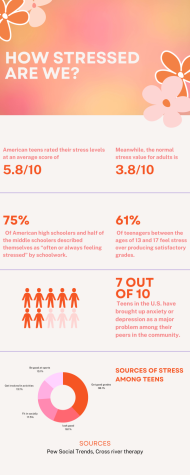Accepted or Rejected
As college decisions come to an end, Grace Bartlett explores the stress and anxiety the application process can bring.

As March comes to an end, the weather gets warmer, spring sports begin, and green is finally returning to the trees. But the end of March doesn’t just bring winter to a close, it also brings college admission decisions. For the next few weeks, anxiety-ridden seniors will obsessively check emails and admission portals for news that will determine the next few years of their lives. For some March 30th is the day they’ve been waiting for since the beginning of their academic careers, Ivy Day. The day that Ivy League colleges release their decisions is full of nervous excitement but more often, disappointment due to steadily declining admission rates. In 2012, the Harvard acceptance rate was 7.92%. As of 2022, the acceptance rate was 4.59% and it is predicted this number will continue to drop, along with the rest of the ivies.
Applying for college has always been a stressful time for high schoolers with 76% of students feeling high levels of stress, but in recent years the process of applying and preparing for college has only gotten more intense and complicated. Due to covid exceptions such as not needing to take the SAT or ACT, many colleges have experienced a spike in the number of applicants resulting in a more competitive admissions process and ultimately, more rejection. Because of the rising number of applicants, many students are feeling the pressure to be the best. With students taking 6-7 AP or honor classes, doing multiple extra-curricular activities, and being a part of clubs and sports to have a more impressive resume, stress levels within schools are reaching new highs.

With acceptance rates dropping and stress levels rising many high school students are feeling the pressure to get into the best college, no matter the price. The amount of stress and pressure students are under is not good for their mental health, especially as young adults about to experience a big life change. 61% of students report feeling stress over getting “Satisfactory grades” and another 75% say they always feel stressed by schoolwork. High levels of stress like these can lead to mental health issues, high blood pressure, forgetfulness, and disorganization. Ultimately many students are doing more harm than good when it comes to schoolwork and getting the best grades possible. Attempting to live up to nearly impossible and perfect standards will not work out long term and eventually, many of these students will burn out.
Trading your high school experience to get into the best college is not ideal either. There should be a work/life balance, especially in younger years so that as teens transition into adulthood they can set healthy boundaries for themselves to limit burnout and stress. Starting and perpetuating unhealthy habits with schoolwork can transition into unhealthy habits in work and life and will further the toxic work culture in the U.S. It’s important that teens spend their formative years creating healthy boundaries and balance. Constantly missing out on social events and spending time with peers, both things that can help lower stress levels, due to school work and an excess of extracurricular activities is not good for teens who are already facing high expectations. It is important to know how to manage and deal with stress and anxiety and not to turn to unhealthy ways of coping. Though stress and rejection are all part of the learning and college application process, the levels and extremes teens are facing in current years is not normal and should not be treated as such.
Your donation will support the student journalists of West High School. Your contribution will allow us to purchase Scholarship Yearbooks, newsroom equipment and cover our annual website hosting costs.

Grace Bartlett is a senior at West High. This is her second year on staff and she is one of the Profiles Editors. Outside of the news room, Grace enjoys...


